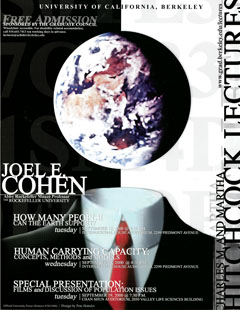
Joel E. Cohen
Abby Rockefeller Mauz, The Rockefeller University
Charles M. and Martha Hitchcock Lectures
September 12, 2000International House, Chevron Auditorium — 2299 Piedmont Avenue, UC Berkeley Campus
About Joel E. Cohen Cohen is the Abby Rockefeller Mauzé Professor of Populations at the Rockefeller University. At Columbia University, he is Professor of International and Public Affairs and Professor of Earth and Environmental Sciences. He heads the Laboratory of … Continued
International House, Chevron Auditorium - 2299 Piedmont Avenue, UC Berkeley Campus Berkeley Graduate Lectures [email protected] false MM/DD/YYYYAbout Joel E. Cohen
Cohen is the Abby Rockefeller Mauzé Professor of Populations at the Rockefeller University. At Columbia University, he is Professor of International and Public Affairs and Professor of Earth and Environmental Sciences. He heads the Laboratory of Populations at Rockefeller and Columbia Universities. His research deals with the demography, ecology, epidemiology and social organization of human and non-human populations. In 1999, Cohen was the co-recipient of the Tyler World Prize for Environmental Achievement for his work in advancing the environmental understanding of human population dynamics. He was the first winner of the Olivia Schieffelin Nordberg Prize, in 1997, “for excellence in writing in the population sciences.” The Nordberg prize recognized Cohen’s book, How Many People Can the Earth Support? (1995). This book, considered his masterpiece, explores the uncertainty of future human population growth and argues that demographers, biologists, environmentalists, and economists know a lot less about population than they think. Cohen has written, co-authored, and edited numerous books, which include studies in population and economics, public health, ecology, and a book of scientific and mathematical jokes, Absolute Zero Gravity (with B. Devine, 1992). His most recent book is Comparisons of Stochastic Matrices, with Applications in Information Theory, Statistics, Economics and Popular Sciences (with J.H.B. Kemperman and Gheorghe Zbaganu, 1998). Among his many awards, Cohen has received the Mercer Award of the Ecological Society of America (1972), and the Sheps Award of the Population Association of America (1992), for “outstanding contributions to mathematical demography or demographic methodology.” In 1984, he was named one of “America’s Top 100 Young Scientists” by Science Digest. Cohen has served as a Trustee of the Russell Sage Foundation (1989-1999), a member of the Scientific Advisory Board of the Institute for Scientific Interchange (1991-present), a member of the Educational Advisory Board of the John Simon Guggenheim Memorial Foundation (1985-present), and a member of the editorial board of The American Scholar (1994-1999). Cohen was born in 1944 in Washington. He received two doctorates from Harvard, one in 1970 in Applied Mathematics, and one in 1973 in Population Sciences and Tropical Public Health.
Watch lecture video here.